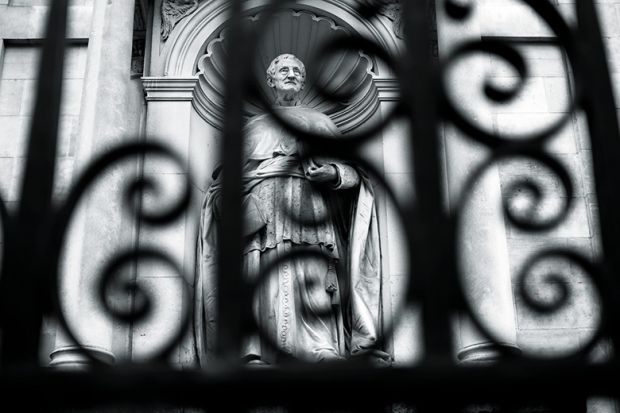What is a university? You probably have your own thoughts on the matter. And if you don’t, there’s no shortage of definitions to choose from.
Donald Trump’s isn’t the same as Alexander von Humboldt’s. It’s the latter’s concept of the modern research university that many of the rankings, including our own, try to distil and capture today.
Along the road, definitions have been challenged and redrawn by political innovators such as Lionel Robbins, whose eponymous review ushered in dramatic expansion of the UK’s higher education system. But the classic of the genre is still John Henry Newman’s The Idea of the University.
Newman’s treatise was, inevitably, invoked in the first day of debate in the House of Lords on the Higher Education and Research Bill. Alternative definitions offered by the lords and ladies came from sources as diverse as a papal bull (which suggested that a university should be “open to all and dedicated to the pursuit of truth in the service of others”) and the one-time poet laureate John Masefield (who said a university was “a place where those who hate ignorance may strive to know, where those who perceive truth may strive to make others see”).
This wasn’t just grandees showing off their learning. The identity of our universities is at the heart of the bill, with many harbouring grave concerns about plans to open up university status to a new wave of for-profit providers – very few of which will be universities as we know them.
The first vote in the Lords in favour of an amendment that defines what a university is – setting in vellum its commitment to autonomy, to academic freedom, and to teaching a broad range of subjects – reflects the genuine fear that the soul of higher education is being mortgaged to pay for what Lord Patten, the University of Oxford’s chancellor, describes as “a shot of entrepreneurial vim”.
Jo Johnson, the universities minister, is adamant that this is a misinterpretation of his bill, and that universities are too comfortable with the status quo, too unwilling to face up to new realities. But what is playing out in the rocky passage of the bill reflects a larger question for universities: how can they best serve a world that’s changing so fast?
Part of the answer is by remaining constant in their essentials: defining themselves as the soul of our societies, the places that always have and always will ask difficult questions (and investigate them), pass knowledge between generations, and protect free inquiry and debate above all else.
The role of the university as society’s metronome was highlighted in last week’s Times Higher Education by Graham Virgo, pro vice-chancellor for education at the University of Cambridge, who proposed adding a clause to the bill that made explicit their duties as “critic and conscience”.
A similar theme is picked up in a paper published last week by the Centre for Global Higher Education. In order to evolve and progress, societies must “adjust beneficially to changing threats and opportunities” while remaining “integrated and internally cooperative”, writes Gordon Redding, visiting professorial fellow at the UCL Institute of Education.
How does this happen? “The testing ground and main field for the expression of new thinking, reflexivity, argument, and the codifying of forward movement, is that of universities,” he says. “The question now is whether they…are losing their effectiveness in carrying out the remit. A parallel question for some societies is whether they were actually designed for that purpose, or whether that intent has been replaced.”
These are big questions, and they’re as relevant in Asia, where university development continues apace, as in the US, where Trump will this week sweep into the White House on a tide of social division.
In our cover story this week, we spend time in several American cities assessing what this new political era will mean for US campuses. What shines through is that the defining features of universities – their commitment to freedom of enquiry, ideas and debate – are needed now more than ever. Everything changes, but some things must stay the same.
后记
Print headline: Refining our terms
